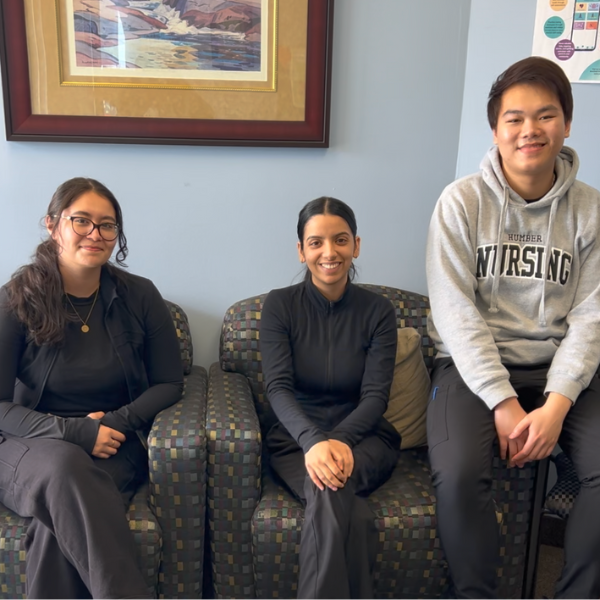By Hassan Farhan Tariq
Toronto is widely recognized for its cultural diversity, with immigrants representing a substantial portion of its population. As of the 2021 Census, immigrants, those born outside of Canada, account for 46.6% of the city’s population. Among the immigrant population in 2021, 391,680 arrived between 2016 and 2021, representing 13.7% of the total immigrant population. (Source: Statistics Canada, 2021 Census).
To address the healthcare needs of this growing group, the HAP Clinic (Health for All Partnership), a collaboration between Humber College and MNLCT, was launched in September 2023 at MNLCT’s Finch Office in North York. The clinic offers free health services to newcomers, immigrants, and others who face barriers to accessing healthcare, regardless of their immigration status or financial situation.
Who Can Benefit from the HAP Clinic?
Supported by Humber College nursing faculty and students, the mission of the clinic is to assist as many people as possible, regardless of their circumstances or healthcare barriers. Many individuals struggle with a lack of proper documentation and have no access to the health care they need.
We are here for everyone who needs medical assistance,” says Nicole Chung, a Digital Outreach Coordinator at MNLCT.
Since opening, the clinic has served over 300 clients, providing health care to those in need. Chung also highlights the need for more clinics like this across the Greater Toronto Area (GTA).
Impactful Care at the HAP Clinic
Manraj Sandhu, a Registered Practical Nurse completing a Bachelor of Science in Nursing at Humber College and student nurse lead at the clinic, shares her experience: “During my placement at the HAP Clinic, I saw firsthand how impactful the work we’re doing is for our clients.” She explains that the clinic connects clients to essential services like dental and vision care, often at no cost or at reduced prices. She also emphasizes the importance of providing preventative care, particularly for those without OHIP. Through these efforts, the clinic helps reduce financial and emotional stress, while offering a safe space for clients to access the care they need.
A Range of Detailed Services
The HAP Clinic offers a variety of free healthcare services, including regular health check-ups and referrals to specialized doctors, nurse practitioners, and midwives when necessary. In addition to physical care, the clinic identifies clients’ mental health needs during a general assessment. Using a holistic approach that includes psycho – social – spiritual assessment, the clinic supports clients by referring them to appropriate organizations for mental health services, such as MNLCT or CAMH.
Sandra Ramirez, an intake worker and interpreter at the clinic, emphasizes the importance of providing holistic care.
We’ve developed and initiated activities and programs to raise awareness and address both mental and physical health needs, as well as social and spiritual” she explains.
Ramirez also highlights the growing difficulty in accessing primary care, noting that many clients struggle with finding family doctors due to the scarcity of available healthcare providers in Ontario.
Education and Community Engagement
To enhance its mandate, the HAP Clinic regularly organizes free workshops and seminars to help newcomers navigate the provincial healthcare system. These programs provide healthcare information and assist clients in understanding how to find a family doctor, apply for an OHIP card, and access key services ranging from dental care to support for families caring for members with dementia. The clinic offers both virtual and in-person seminars to make it easier for clients to find essential information. Additionally, patients are provided with health kits, clothing, and food from the MNLCT pantry to address their basic needs, demonstrating the clinic’s commitment to not only healthcare but the overall well-being of the community.
Support for Healthy Pregnancies
Though not the predominant demographic of patients at the HAP clinic, one focus of the care is providing comprehensive support for pregnant women, particularly newcomers who face unique challenges in accessing healthcare services. The HAP team works closely with expectant mothers to offer foundational care, guiding them through prenatal and postnatal health with resources that extend beyond medical attention.
The clinic sets up pregnant women with midwives and provides educational resources about healthy pregnancy practices, parenting classes, and stress management. One of the clinic’s key roles is educating newcomers about the importance of accessing hospital services for childbirth and understanding the expectations and realities of healthcare access in Canada, especially for those without OHIP or with undocumented immigration status.
Ramirez notes that fears surrounding hospital visits among newcomer communities, especially undocumented individuals, are often grounded in legitimate concerns. These include apprehensions about incurring high medical costs, facing immigration-related scrutiny, or even risking the loss of child custody. Such fears can lead pregnant women to avoid seeking essential prenatal care, jeopardizing both their health and that of their babies.
Healthcare Help for the Undocumented
The HAP team addresses these challenges by providing personalized support for clients, regardless of their immigration status. Rather than merely directing clients to medical services, the HAP team informs them of their healthcare options, assists clients in making informed decisions, and advocates for their well-being including low-barrier and low-cost care options. This approach acknowledges the complex realities faced by undocumented individuals and strives to build trust within a healthcare system that is often inaccessible for people without health insurance.
Despite these efforts, many patients remain hesitant, fearing that one hospital visit could trigger unaffordable costs or draw the attention of immigration authorities. These concerns don’t disappear with information alone, which is why the HAP Clinic continues to provide consistent, one-on-one advocacy, trauma-informed care, and trusted follow-up support from staff who understand the stakes.
Client Stories of Support and Gratitude
Sandhu shares a memorable experience from her time at the clinic:
One client returned with her newborn to express her deep gratitude for the support we provided during her pregnancy.”
Sandhu adds that many clients often express how the clinic’s services have been a lifesaver. “After receiving help, many clients tell us they feel a weight lifted off their shoulders, no longer worrying about medical bills. It’s a rewarding feeling to see how our work can truly change their lives.”
Additionally, clients highly value the resources the clinic connects them to, often at no cost or lower prices. One client shared, “The help you’ve given me has changed my life, not just for my health but for my whole family. We wouldn’t have known where to go without your advice.”
A Growing Need for Resources
The HAP Clinic operates three days a week, from 9:30 a.m. to 3:30 p.m., but due to limited staffing, it cannot meet the growing demand. “Since opening, we’ve helped hundreds of patients, and now we need more healthcare professionals, such as midwives, nurses, and doctors, to serve even more people in the community,” says Chung.
The clinic closed in early April when the Humber College semester concluded, and is scheduled to reopen in September 2025 when the new semester begins.
The HAP Clinic demonstrates how focused healthcare programs can make a difference in people’s lives. By offering free and accessible health services to a multicultural community, the clinic does more than treat patients—it helps families and builds resilience. The HAP Clinic serves as a vital resource for new immigrants who want to create a healthier and more stable future in Canada. Through direct healthcare services and community support, the clinic showcases the power of compassionate care and community commitment.
Consider supporting MNLCT and help expand vital initiatives like the HAP Clinic to ensure these services remain available for newcomers in need. Your contribution will make a lasting difference in building healthier, more stable communities.






